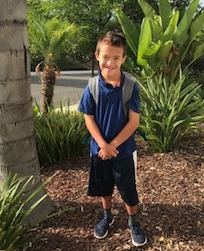
Despite everything he has been through, Aiden has a fighting spirit and embraces life.
By Erica Gadbois
Julie and Junior Ilaoa always knew they wanted children, and when they got married, a baby was first on their list of plans for their life together. However, conception proved difficult for the couple. “It wasn’t happening, so we went to see a specialist,” recalls Julie, “and they told us we had a zero percent chance on our own.” Although it still offered them daunting odds of four to 10 percent, the Ilaoas prepared for in vitro fertilization. Their therapy was slated to begin on a Tuesday. Just two days before — on Father’s Day — Julie and Junior made a joyful discovery. Julie was pregnant.
From that moment, their son, Aiden, now 10, was given the nickname “Vavega,” meaning “miracle” in Samoan — a nod to Junior’s roots. Before he was even born, that moniker began to ring more true than Julie and Junior could have ever known.
During one of Julie’s regular pregnancy screenings, doctors suspected Aiden would be born with Down syndrome (DS), which is the most common chromosomal anomaly and occurs in approximately one in every 800 babies in the United States. DS arises when a child has an extra copy of their 21st chromosome. This extra chromosome is associated with medical co-existing conditions and developmental delays. Although some traits of DS, such as low muscle tone, slower physical growth and smaller stature in relation to peers, and mild to moderate intellectual impairment affect the majority of people with DS, no two individuals have the same symptoms or experience. While some may go through life without major health problems, others have significant medical complications, most commonly congenital heart conditions.
Aiden was also found to have such a condition — specifically, atrioventricular canal defect, in which the heart is atypically divided and allows excess blood flow to the lungs, in turn straining and enlarging the heart — meaning he would need to be in a neonatal intensive care unit (NICU) after his birth. The Ilaoas chose Scripps Memorial Hospital La Jolla, where Rady Children’s Hospital-San Diego operates the NICU, and readied themselves to meet their little boy.
Aiden arrived seven weeks premature on January 14, 2008, and immediately went into cardiac care. But within 24 hours of life, it was clear his needs were more complex than anticipated. He would need open-heart surgery, requiring transport to a Level 4 NICU. The team at the Rady Children’s Hospital NICU Main Campus was ready and waiting. After his surgery, Aiden remained under the care of the neonatal intensivists as well as Paul Grossfeld, M.D., a board-certified pediatric cardiologist at Rady Children’s and an associate clinical professor at UC San Diego School of Medicine, for almost three months. He also faced issues beyond his heart, including an umbilical hernia, hypothyroidism and a cyst between his prostate and bladder.
“He finally got to go home,” says Julie, “[but] we ended up being life-flighted back within a week. He was turning blue.” Aiden had his second open-heart surgery and a difficult recovery, during which he required feeding tubes and developed reflux. When he underwent a third surgery soon after —a tough ordeal for Aiden and his parents alike — the Ilaoas were directed to the Rady Children’s Down Syndrome Center. The center provides multidisciplinary evaluations for children with DS with the goal to ensure their specific medical and developmental needs are being addressed. It also helps connect DS families to one another and provides support, resources, education and advocacy. The center has been open since 2008 and was made possible through a partnership between Rady Children’s and the nonprofit DS Action, of which Julie now serves on the board.
Upon connecting with other families and with staff including Lauren E. Gist, M.D., M.P.H., medical director of the Down Syndrome Center, the Ilaoas quickly felt at home. Aiden also began participating in crucial early intervention services, including occupational therapy, physical therapy and speech therapy, empowering him to grow and flourish developmentally. “We learned so much,” Julie recalls. “I was so focused on the medical and daily survival, I hadn’t had the chance to think about or research [these things]. They helped me understand the possibility of so many other things.”
That sense of support and belonging has been going strong in the years since. Aiden still sees Dr. Grossfeld —“we really need him,” Julie remarks — as well as six other Rady Children’s specialists in areas including ophthalmology, surgery, urology and endocrinology. He has had a total of 12 surgeries and procedures, battled illnesses including croup and pneumonia, and has been to urgent care multiple times. Although there are “probably seven urgent cares between us [in San Marcos] and Rady [Children’s] … we wouldn’t go anywhere else. It’s a no-brainer,” Julie explains. “We say, ‘nope. We’re going where they know us.’”
In spite of all Aiden has gone through in his young life, “none of it really seems faze him,” his mom marvels. “He’s so super funny and smart, and just real strong.” The fifth-grader, who adores school, is also a bit of a Renaissance man. He enjoys activities ranging from Samoan dancing, horseback riding and playing the bongo drums to basketball, baseball and giving his dad a run for his money on the golf course. However, what anyone would notice first about Aiden are his warm heart and outgoing personality. “He’ll walk right up to people and say, ‘hey, nice to meet you. My name’s Aiden,’” Julie says. Being well-rounded, kind and equipped with an uncanny ability to spread smiles — not to mention an unparalleled fighting spirit that started with his first breath — might seem like a lot for one little boy. But what else would you expect from a vavega?
Published October 2018